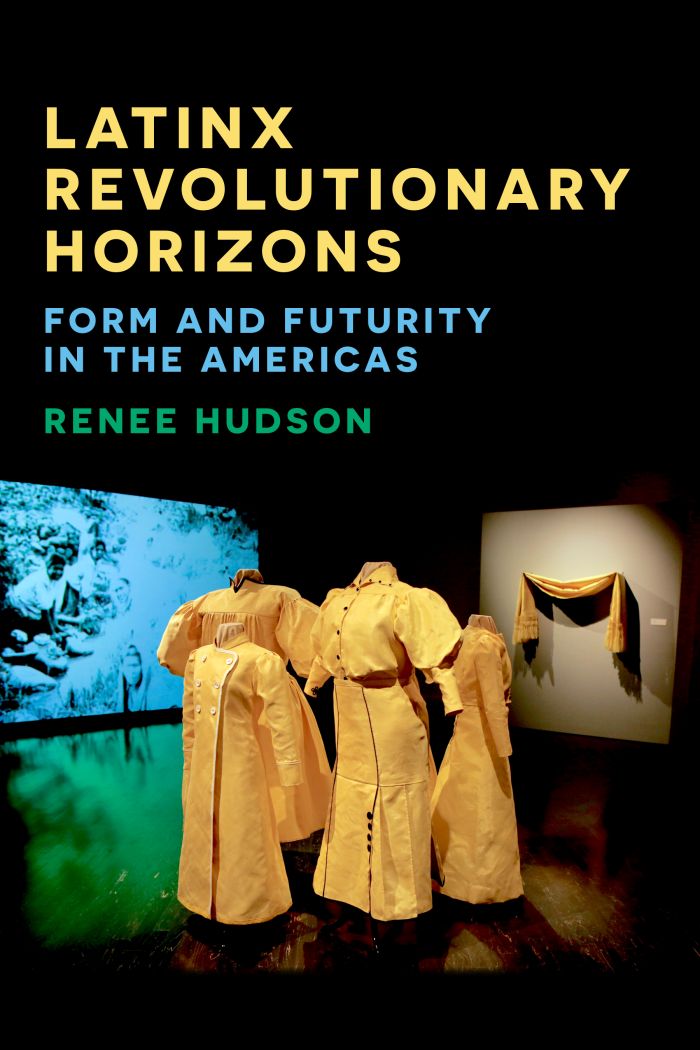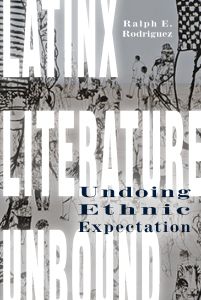Latinx Revolutionary Horizons
Form and Futurity in the Americas

This book can be opened with

A necessary reconceptualization of Latinx identity, literature, and politics
In Latinx Revolutionary Horizons, Renee Hudson theorizes a liberatory latinidad that is not yet here and conceptualizes a hemispheric project in which contemporary Latinx authors return to earlier moments of revolution. Rather than viewing Latinx as solely a category of identification, she argues for an expansive, historicized sense of the term that illuminates its political potential.
Claiming the “x” in Latinx as marking the suspension and tension between how Latin American descended people identify and the future politics the “x” points us toward, Hudson contends that latinidad can signal a politics grounded in shared struggles and histories rather than merely a mode of identification. In this way, Latinx Revolutionary Horizons reads against current calls for cancelling latinidad based on its presumed anti-Black and anti-Indigenous framework. Instead, she examines the not-yet-here of latinidad to investigate the connection between the revolutionary history of the Americas and the creation of new genres in the hemisphere, from conversion narratives and dictator novels to neoslave narratives and testimonios.
By comparing colonialisms, she charts a revolutionary genealogy across a range of movements such as the Mexican Revolution, the Filipino People Power Revolution, resistance to Trujillo in the Dominican Republic, and the Cuban Revolution. In pairing nineteenth-century authors alongside contemporary Latinx ones, Hudson examines a longer genealogy of Latinx resistance while expanding its literary canon, from the works of José Rizal and Martin Delany to those of Julia Alvarez, Jessica Hagedorn, and Leslie Marmon Silko. In imagining a truly transnational latinidad, Latinx Revolutionary Horizons thus rewrites our understanding of the nationalist formations that continue to characterize Latinx Studies.
Thoroughly researched, and beautifully written, this book offers a convincing argument that Latinx revolutionary horizons work in counterintuitive, non-sequential, and non-linear ways across time and space. This is a powerful and thoughtful intervention into the field of Latinx Studies.—David J. Vázquez, author of Triangulations: Narrative Strategies for Navigating Latino Identity
Richly textured with evocative and eloquent analyses, Latinx Revolutionary Horizons mobilizes an innovative and wide-ranging temporal and geographic archive to expand how we understand and imagine revolution in Latinx America and beyond.—Jennifer Harford Vargas, author of Forms of Dictatorship: Power, Narrative, and Authoritarianism in the Latina/o Novel
By reading contemporary Latinx literature with key 19th century texts of Latin American literature, Hudson demonstrates Latinx literature is continental in form as well as content, the consequence of layered conquests, racial ideologies, and imperialisms. The slave narrative, the testimonio, the dictator novel, guerilla conversion novels, all made significant contributions to the field of Latinx letters. Hudson moves beyond a New Historicism towards a theory of hemispheric aesthetics that are revolutionary precisely because they are place-based, and fractured by the multi-racial, multi-ethnic, multi-lingual realities the Spanish and British encountered upon their arrival in the 'new world.'—María Josefina Saldaña-Portillo, author of Indian Given: Racial Geographies Across Mexico and the United States
One of the true achievements of Latinx Revolutionary Horizons is its demonstration of just how far Latinx literary scholarship has come. . . Hudson builds on the work of these theorists of the Latinx experience to provide another horizon for Latinx literary scholarship—one in which the reader takes center stage, in which revolution is possible not only through the works we read but also through the act of reading itself.—Los Angeles Review of Books
Introduction: Forming Revolutions | 1
PART I – LATINX REVOLUTIONARY CONSCIOUSNESS
1 Captive Revolutions: Revolutionary Consciousness as Racial
Consciousness in Ruiz de Burton and Cisneros | 33
PART II – LATINX REVOLUTIONARY PEDAGOGIES
2 Romancing Revolution: The Queer Future of National Romance
in Rizal, Rosca, and Hagedorn | 69
3 Teaching Revolution: The Latinx Bildungsroman in Alvarez and Díaz | 100
PART III – LATINX REVOLUTIONARY IMAGINARIES
4 Retconning Revolution: The Solidarity of Form in García, Barnet, and Avellaneda | 133
5 Speculative Revolutions: Otrxs Latinidades in Delany and Silko | 159
Coda: Is the X a Commons? | 191
Acknowledgments | 201
Notes | 205
Bibliography | 255
Index | 281




